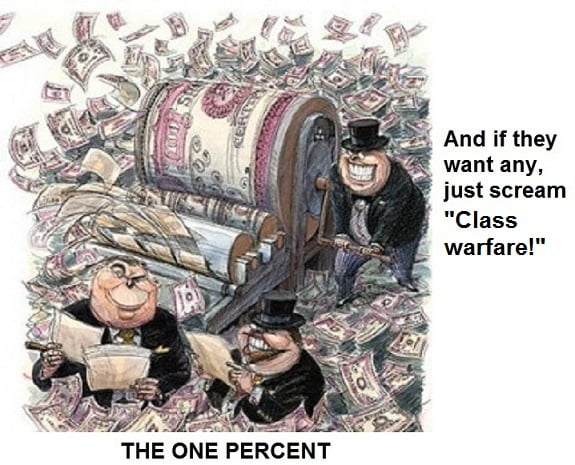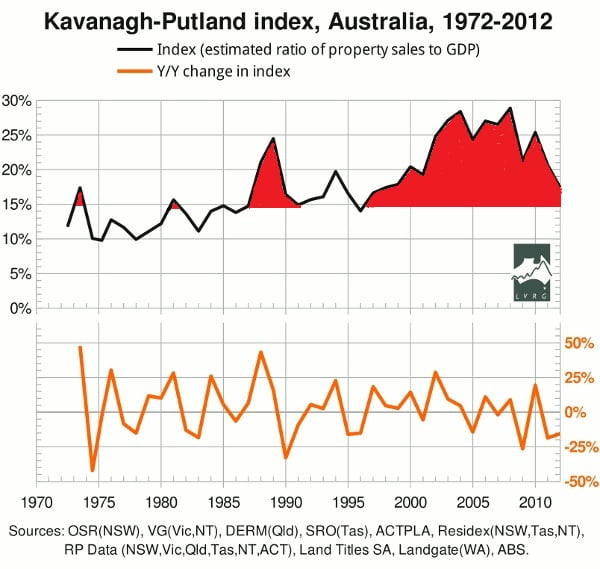You say we need more funds to tackle poverty, homelessness, health, the environment, education and infrastructure? I say instituting the Henry Tax Review is a BIG step towards solving those problems.
All posts by Bryan Kavanagh
SO IT’S ALL BEHIND US NOW?
Once you understand the importance and centrality of land to the economy, the above index provides unique insights.
The three areas coloured red on the top line of the chart in 1973, 1981 and 1988/89 represent real estate bubbles. Each was followed by an economic recession when the bubble burst. You will see the fourth red bubble dwarfs the earlier three by an enormous degree of magnitude.
It should be noted the 1994 real estate peak was not a national bubble because it actually included the final bank sell-off of major commercial and industrial distressed properties from the late ’80s-early ’90s bubble. It also included a booming real estate market in Queensland which was out of kilter with the rest of Australia (and for which Queensland, along with South-East Asia, paid the penalty in 2007.)
Many consider Australia has avoided the worst of the global financial collapse and that the extended bubble we’ve experienced since the late 1990s won’t also burst. This hopeful scenario is along much the same lines as the great American economist Irving Fisher who is unfortunately best remembered for a great mistake, when he announced just before the Wall Street collapse in 1929 that the stock market had reached “a permanently high plateau”.
The purpose of this website is to deliver the good news that a fiscal remedy to bring a quick turnaround from financial collapse IS available. Unfortunately, the US and Europe haven’t been allowed to discover it yet.
You say we need more funds to tackle poverty, homelessness, health, the environment, education and infrastructure? I say instituting the Henry Tax Review is a BIG step towards solving those problems.
Uh oh!
RENT-SEEKING = PLUTOCRACY = VAST INEQUALITIES = SOCIETAL COLLAPSE
The English aristocracy unwittingly engineered the British Empire’s downfall, just as surely as the latifundia of Ancient Rome created its collapse.
Wealthy landholders will never concede they have a duty to pay the rent to the public purse for the lands they occupy. As they have unequalled power and influence, they’ve successfully written out of the annals of history how their techniques dispossess and impoverish people. History can deal with anything else. It may describe all the battles, all the personalities, but it must never admit they are ultimately fought over natural resources – LAND – because this would lead to certain fiscal conclusions.
The rent-seeking 1% in the USA now control 40% of the nation’s wealth, but reform movements such as Occupy Wall Street and the Tea Party haven’t discovered the simple mechanism by which the US plutocracy is bringing the once great nation to its knees. Pax Americana is destined for the same scrap heap to which Pax Brittanica was consigned.
“Arab Spring” revolutions are also failing because their leaders haven’t seen the economic urgency to shift revenue bases from workers and profits to holders of land. This would reconcile people, economics and the planet: however, the “revolutionaries” seem unaware of the fact.
Sadly, both ancients and modern Greece and Italy seem to have learned nothing at all over the centuries about the ills wrought by land speculation and monopoly, nor the system of credit which supports this malady that lingers.
Breaking the longstanding pattern offers the prospect of economic justice, peace and stability, but is the 99% up for it?
Watch this space …
You say we need more funds to tackle poverty, homelessness, health, the environment, education and infrastructure? I say instituting the Henry Tax Review is a BIG step towards solving those problems.
“Productive Americans of center, left and right, unite! You have nothing to lose but your rents.”
 Michael Lind deftly exposes the economic parasites in three excellent articles at SALON.com.
Michael Lind deftly exposes the economic parasites in three excellent articles at SALON.com.
http://www.salon.com/2013/03/21/private_sector_parasites/
http://www.salon.com/2013/03/22/how_rich_moochers_ruin_america/
http://www.salon.com/2013/03/25/defeating_useless_rich_people/
These people are not only to be found in the USA.
It’s time we captured economic rent back from the rent-seeking thieves.
Are you listening, Institute of Public Affairs – or perhaps you’re squarely behind the rentiers? If so, shame on you!
You say we need more funds to tackle poverty, homelessness, health, the environment, education and infrastructure? I say instituting the Henry Tax Review is a BIG step towards solving those problems.
PEPPERMINT GROVE V. YARRABAH
AUSTRALIAN BUREAU OF STATISTICS RELEASE DATED 28 MARCH 2013: POPULATION AND HOUSING
It’s not about class warfare, folks (although there’s a bit of that, too). Australia’s locational living differentials are explained by the BIG rent-seekers (the 1%) capturing OUR land and resource rent unto themselves and clotting together to retain it. The tax regime has rigged the distributional system to assist them.
The only difference between Africa and Australia is that the rentiers haven’t worried too much about covering the scene of the crime in Africa. Their techniques are a little more sophisticated here in Oz.
You say we need more funds to tackle poverty, homelessness, health, the environment, education and infrastructure? I say instituting the Henry Tax Review is a BIG step towards solving those problems.
EVERYTHING POINTING IN THE ONE DIRECTION FOR POLICYMAKERS
MICHAEL PASCOE, IS THAT REALLY YOU?
Especially that final line. Good on you, boyo!
http://www.theage.com.au/business/grants-do-not-help-first-home-buyers-20130327-2gtas.html
You say we need more funds to tackle poverty, homelessness, health, the environment, education and infrastructure? I say instituting the Henry Tax Review is a BIG step towards solving those problems.
LAND PRICES ARE MUCH MORE THAN A FUNCTION OF SUPPLY AND DEMAND
 I’m constantly told Australia’s land prices are astronomically high because of our high rate of immigration and the shortage of supply of residential allotments. So, it seems the price of a block of land has simply been reduced to an issue of supply and demand.
I’m constantly told Australia’s land prices are astronomically high because of our high rate of immigration and the shortage of supply of residential allotments. So, it seems the price of a block of land has simply been reduced to an issue of supply and demand.
However, in over 40 years as a real estate valuer, I’ve seen there’s much more at play than supply and demand in determining the price of land.
Don’t get me wrong. The rate of immigration and the amount of available residentially-zoned land certainly do bear upon the cost of a site, but these are basically third-level issues.
There is an abundant supply of suitable land, but residential developers’ drip-feeding of allotments onto the market can create an exaggerated impression of shortage, a shortage in which we’ve seen potential purchasers willing to camp out overnight on a subdivision rather than miss out on the opportunity to buy a lot in the release of the next stage of the estate on such-and-such a date. Creating this impression of scarcity is a marketing function which should not be confused with the price of a block of land, however.
Statutory development costs, once repaid over a period in rates or taxes by the purchaser of a site, are now required by authorities to be paid upfront by the developer, and this has also added more than supply and demand considerations to the cost of allotments.
The most important factor in the price of a block of land, by far, is the extent to which governments capture the economic rent of sites via municipal rates or state land taxes.
From a valuer’s point of view, it’s arguable that if state governments were to introduce an all-in land tax struck at sufficiently high level, the price of land could actually drop towards zero, as little would remain of its annual rent to be privately capitalised into a price. One is left to wonder why this point is rarely taken into account in addressing the increasing problem of housing affordability. In whose interests but banks are constantly-inflating land prices?
It stands to reason that increasing land values should not accrue to land owners only. The whole community has an interest in recapturing part of the uplift in value generated by public infrastructure, but this seems to have escaped the notice of those policymakers who believe privatisation of our public highways is a valid way to fund them. John Goldberg has long been an opponent of the PPP model, and recent failures are proving him to have been correct. Maybe old ideas about public capture of land values for infrastructure aren’t necessarily bad ideas? May this not be the manner in which capital works projects could be made self-funding?
Land is different from commodities which become obsolete, decay or rust. We all need access to land to live and work, yet it is often held out of the market for the purpose of capital gain, the cumulative process adding to claims of shortage of supply.
Our skyrocketing land prices are exacerbated by the extent to which investment in real estate has been given favourable tax treatment – and by the banking industry’s readiness to advance any amount of credit against the “market” value of a piece of land. I put the word market between inverted commas because land price has proven to be ephemeral, especially when the multi-facets which create land price conspire to generate a bubble, such as has been allowed to develop in Australia under the Howard, Rudd and Gillard governments since 1996. Was it also “undersupply” which created the 1973 real estate bubble? The 1981 bubble? The 1988/89 bubble? No, rather a tax system which gives the green light to investors/speculators–at the expense of our youngsters–such as to generate an over-enthusiasm for real estate which then elicits a repetitive cycle of boom and bust.
It’s entirely arguable there’s no genuine market in land unless local government rates or state land taxes are set sufficiently high to make the owners of vacant or underused land use it or else sell it. Short of this stimulus, where is the meeting of market players when such land can simply continue to be held out of supply?
In “Unlocking the Riches of Oz: a case study of the social and economic costs of real estate bubbles 1972 to 2006” I put the proposition that the current Australian real estate bubble acts as a proxy to suggest the western world was about to experience financial collapse as national land price bubbles would begin to puncture. Seven years later, it’s good that Australians haven’t been panicked by the GFC, but it’s quite wrong to assume it’s all behind us simply because Wayne Swan pumped billions into the economy to obviate a sharp economic decline. Our land prices still require substantial (hopefully gradual) deflation before the Australian economy can repair.
That Southern Californians were lulled into a false sense of security by accepting the ‘undersupply’ argument for their exaggerated land prices as late as 2006 should serve as a salutary warning for Australians whose land prices have so far barely begun to contract.
This would seem to be a good time not to be a buyer.
_________
This article was also published on 26 March in Graham Young’s excellent Online Opinion.
You say we need more funds to tackle poverty, homelessness, health, education and infrastructure? I say instituting the Henry Tax Review is a BIG step towards solving those problems.
RUDD V. GILLARD: THE NON-CHALLENGE
 Short of a miracle, the minority Labor government has finally passed the baton to the opposition.
Short of a miracle, the minority Labor government has finally passed the baton to the opposition.
In THE AGE today Chris Burgess of Port Melbourne reminds us Confucius had something to say on issues such as the Gillard-Rudd contretemps:
“Before you embark on a journey of revenge, dig two graves.”
So, if Kevin Rudd were to throw his hat in the ring to lead the party when Labor is decimated at the September 14 election, he is now almost certain to be defeated.
You say we need more funds to tackle poverty, homelessness, health, education and infrastructure? I say instituting the Henry Tax Review is a BIG step towards solving those problems.







